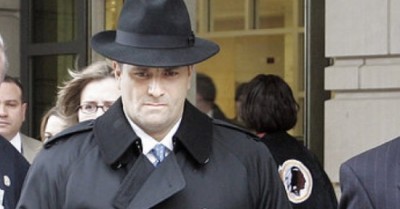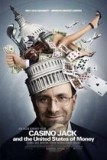| Reviews & Columns |
|
Reviews DVD TV on DVD Blu-ray 4K UHD International DVDs In Theaters Reviews by Studio Video Games Features Collector Series DVDs Easter Egg Database Interviews DVD Talk Radio Feature Articles Columns Anime Talk DVD Savant Horror DVDs The M.O.D. Squad Art House HD Talk Silent DVD
|
DVD Talk Forum |
|
|
| Resources |
|
DVD Price Search Customer Service #'s RCE Info Links |
|
Columns
|
|
|
Casino Jack and the United States of Money

There's plenty to be said, mostly by people smarter than me, about the corrupting influence of lobbying and campaign fundraising on the legislative process. Everyone, no matter what their political stripe, will complain that "nothing gets done in Washington, D.C."--that no meaningful legislation that's good for Americans can get to a vote because of the wealthy business interests who money up against it, that politicians can't get any work done because of the amount of their time they have to spend hosting fundraisers and calling people to beg for money. And thanks to the Supreme Court's recent ruling, now corporations can spend freely to buy even more influence. But start talking about fixing the system, about comprehensive campaign finance reform, and everybody loses their mind. You can't dictate that, genie's out of the bottle, socialism, whatever.
"Has it always been like this?" asks a narrator, early on in Alex Gibney's terrific new documentary Casino Jack and the United States of Money. "Or has something changed?" Who knows? What is safe to say is that there's no going back--not if a story like that of Jack Abramoff didn't change things. The press focused on his villainy, his courtroom attire, whether he had met Bush this time or that, how deep in it Tom DeLay was. There was more to it than that. There was much more to it than that.
Casino Jack is a wide-ranging tale, broad in its scope, going from the Reagan years to the second Bush administration, from the U.S. to the Marianas Islands to Malaysia, from college Republican clubs to the corridors of Washington's most powerful people. Using archival footage, new interviews, wiretap recordings, and occasional reenactments, Gibney tracks Abramoff's rise to D.C. supremacy, starting with a fascinating look at the young Republicans who ended up shaping modern conservatism--Abramoff, Ralph Reed, Grover Norquist, and a ridiculously young-looking Karl Rove. From there, we see how Abramoff and his ilk ascended following the Republican Revolution of 1994, and made a fortune defending reprehensible corporate interests and flim-flamming Indian casinos well into the Bush administration.
Gibney is a documentarian of tremendous skill (his previous films include Enron: The Smartest Guys in the Room and the Oscar-winning Taxi to the Dark Side, as well as the recent Tribeca selection My Trip to Al-Qaeda), and Casino Jack is strikingly well-made--cleverly edited, fast-paced, clear but smart. The most fascinating element is the exposition, the nuts and bolts, how all this worked, how he moved the money, how he bought influence with it, how he chopped it up with his accomplices, how he (for all intents and purposes) laundered it for allies like Reed and DeLay. "Lobbying is a system of legalized bribery," contends Representative Peter Fitzgerald. There's not much reason to dispute that claim.
Casino Jack is not a dull, "talking heads" doc; there are crackerjack stylistic touches (like how the incriminating emails between Abramoff and his partners are presented) and genuinely cinematic sequences, such as the eventual "fall of the house of cards" (thrillingly assembled to the strains of Nina Simone's "Sinnerman"). But it ultimately thrives, as most good docs do, on the personalities of the fascinating characters assembled--not just villains like Abramoff and Reed or regretful fallen men like Bob Ney and Neil Volz, but dupes like David Grosh, the lifeguard who became the president of a front "think tank". Most of the time, when you see someone involved in a story like this who claims that they had no idea what was actually going on, you don't believe them. You totally believe this guy.
Gibney skews more critical of Republicans than Democrats, but then again, Republicans were more complicit here (and the Democrats involved certainly get their due). It's an honest picture--he rabble-rouses without pandering--but it is infuriating, particularly as Representative DeLay, disgraced and charged with criminal violations of campaign finance laws and money laundering, sits with a straight face and tells Gibney's cameras that no, everything's fine, the system works, these kind of hefty donations should be defended as an issue of "free speech." But it's not about free speech. It's about greed and corruption. It is, as we're told at the beginning of the film, about "the selling of America."
Jason lives in New York. He holds an MA in Cultural Reporting and Criticism from NYU.
|
| Popular Reviews |
| Sponsored Links |
|
|
| Sponsored Links |
|
|
| Release List | Reviews | Shop | Newsletter | Forum | DVD Giveaways | Blu-Ray | Advertise |
|
Copyright 2024 DVDTalk.com All Rights Reserved. Legal Info, Privacy Policy, Terms of Use,
Manage Preferences,
Your Privacy Choices | |||||||











